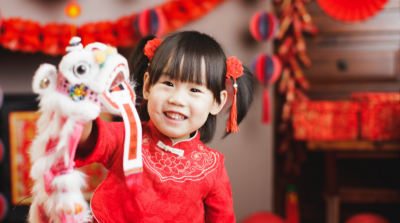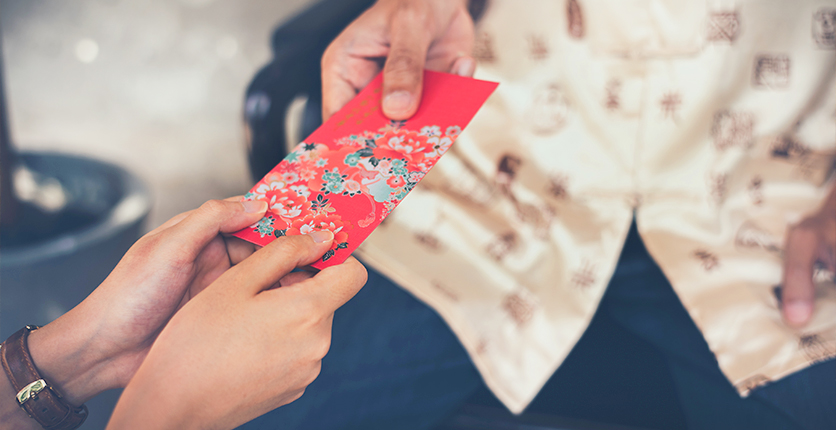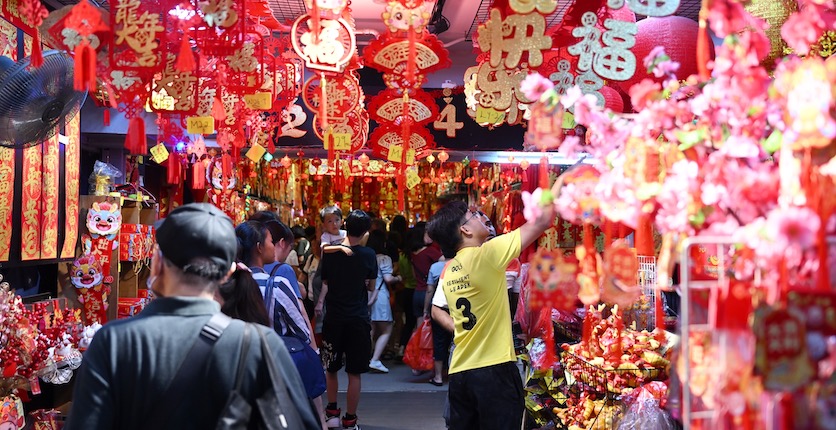It’s that time of the year for all the folk celebrating Chinese New Year to show their appreciation to (almost) everyone they meet during the festive period by giving away money. Yes, we’re talking about the age-old tradition of giving little red envelopes (a.k.a. hongbaos or angbaos) filled with dollar bills.
For some of us, it’s an act of goodwill, good fortune and kindness that comes easy.
For others, it might be nerve-fraying. You could be a newly-married couple, or someone who doesn’t celebrate the occasion but who wants to join in the joy of sharing some of your personal fortune.
Basically, for anyone unaccustomed to Singapore’s particular, unwritten “rules” regarding who gets what amount, presenting these humble packets can make for red-faced affairs (not because of happiness, but due to embarrassment, anxiety, or irritation, sometimes all of these at once).
Save yourself from sweaty palms and headaches with this handy 101-guide to the current “hongbao rates” in Singapore. Or check out this story for even more on “huat” you need to know about hongbaos.
Who gives what?

Before we get to the specific amounts, there is a simple hierarchy to follow regarding who gets to be the giver and who is the receiver. Basically, it’s “older” to “younger” and also, from “adult” to “elderly” (age-wise); and “senior” to “junior” (status or positions).
If you are a married couple, you are the giver. Newlyweds in the first year of marriage are given some leeway, but do check with the more experienced folk around if this is the case.
If you are a working adult (regardless of your marital status), you ought to give to your parents, grandparents or any elderly folk of importance (like aunties and uncles) to you; these elders, too, can give you one in return, as a symbolic gesture.
If you are the boss of a team, department or company, you can also pass some red packets to your employees. The help at home should get one too, with a larger amount, since she or he is in your personal employ. It makes for a nice gesture of appreciation, gratitude and support as a superior and/or employer.
You can also choose to give some hongbaos away to service-related individuals you come into contact with often or whose services you “use” – think hairdressers, security guards at your condo, the cleaner auntie in the office, or even anyone you think needs that extra festive cheer. You just need to make it a token amount for luck. If they are unable or unwilling to accept any cash (in case of crossing any personal or professional lines regarding bribery), then give them some CNY goodies like love letters, oranges or cookies, instead.
Make it an even amount
Whatever amount you pack into a packet, make it an even amount as the Chinese believe it to be auspicious. Never put in an odd-numbered amount as odd numbers are associated with funerals and bad luck. So, think amounts such as $2, $6, $8 and so on.
But, never give away quantities with the number 4 as it sounds like the Mandarin word (“si”) for “death”. Skip amounts like $4, $14, and so on. To keep things simple and also more “auspicious”, give away sums with the number 8 as it sounds like the Mandarin word (“fa”) for “prosper”; dollar bills adding up to $8, $18, $28 and so on, will delight your receivers.
Fresh packets, fresh notes?
While it may be easy to get interesting, colourful or well-designed packets, it’s not quite so easy to fill them up with the crispiest new notes. It’s good to give the bills as freshly gotten from the bank or ATM as possible, but sometimes, you might not have had the time or luck to do so.
If push comes to shove, you might have to consider the ones who are closest or most important to you to be given the best from your stack. If by some unfortunate circumstance you run out of new notes, you can try and apologise ahead to the receiver for the state of the bills inside when presenting the packets.
A no-no: Do not give coins. They are heavy and inconvenient for the receiver to keep; are also somewhat associated by the Chinese with funeral rites; and it looks like you are giving away spare change (it can seem inconsiderate).
The hongbao rates
Now, for the “market” rates on who gets how much. While it is entirely dependent on you, your financial situation and your relationship with the receiver, there will be some occasions where it’s harder to ascertain a “fair and equitable” amount for the person in question. Here are some figures to work with, to help smooth things out for you.

Your parents and in-laws: $80 to $288 (or, the highest amount)
Your grandparents: $80 to $288
Your younger, unmarried siblings: $20 to $100 (amount dependent on their age, and whether they are studying or working)
Your older, unmarried siblings: $60 to $100 (depends on the relationship and/or family convention)
Your children: $20 to $100 (amount increases with age)
Your younger cousins: $20 to $80 (amount increases with age)
Your younger nephews and nieces: $10 to $60 (amount increases with age)
Your single friends/colleagues: $6 to $20 (amount increases with familiarity)
Children of close friends/colleagues: $6 to $10 (amount increases with age and familiarity)
Distant relatives (e.g. distant cousins, cousin-in-laws): $8 to $10
Random children (e.g. your children’s friends, children of distant relatives): $6 to $8
Helpers: $20 to $88
Subordinates at work: $6 to $10 (or more depending on your position/pay, how successful the company is, and/or the number of subordinates)
Service staff: $6 to $10 (or some CNY goodies if cash is inappropriate)
Random people (e.g. your neighbour, the elderly uncle you always bump into at the coffeeshop): $6 to $8
Give, but also save for yourself
While it may be great to spread good fortune, no one is asking you spend a fortune doing so just because it’s tradition.
You might not be able to gift as many hongbaos or fill them up with greater amounts due to your personal financial situation, or that you are saving up for your future needs (think housing, your children’s education, etc.) There’s no shame or guilt in planning for yourself ahead.
Two ways you can make sure there’s enough in the “treasure trove” to last you and the family through all of the CNYs: Endowus and StashAway.
A Singapore-based investment platform, Endowus is all about enabling people to invest their funds and savings better. It is the first digital advisor for CPF, SRS and personal cash savings, with expert service provided with its one all-in, transparent Access fee – meaning investment, transfers, brokerage are all sorted out at a low cost. There are no sales charges, transaction fees, trailer fees or any hidden charges to deal with.
If you have very specific needs or future goals with regards to how to manage your money, then StashAway can help you achieve them. The digital wealth management platform can aid in building your portfolio and wealth, according to your preferences and financial situation. It’s all about having flexible, personalised and intelligent options, so that you can plan how your savings and funds can work best for you (and for your retirement), your way.
Remember, there’s no greater fortune for your family and friends than having you stay healthy, wealthy and wise, for every festive occasion and beyond.
Look up Endowus at https://endowus.com, and StashAway at www.stashaway.sg to plan for how you can invest better so that you can get to give away more for every CNY.
BONUS: SAFRA members enjoy 50% off access fees for first-time users at Endowus, and a 6-month waiver of management fees for investments up to the first $50, 000 at StashAway.








